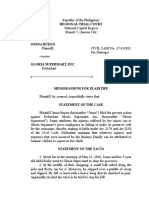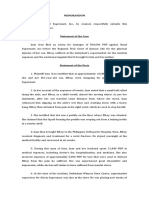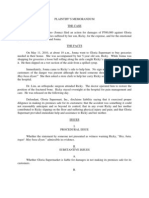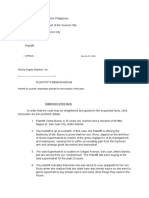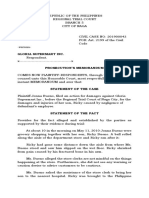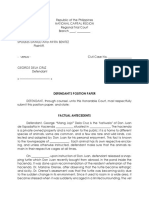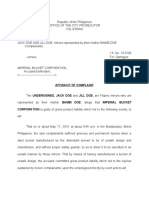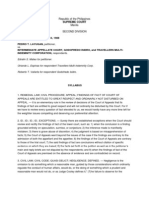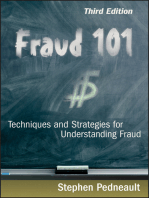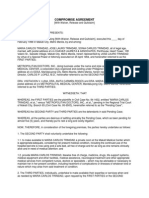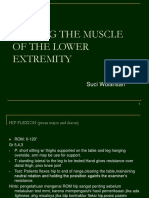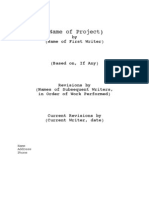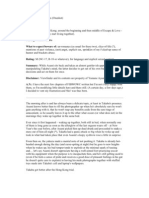0 ratings0% found this document useful (0 votes)
125 viewsSample
Sample
Uploaded by
JérômeBernabéThis document is a memorandum for the plaintiff in a civil case filed against Gloria Supermart for damages. The plaintiff's 5-year old son suffered injuries after slipping and falling on a liquid spill in one of Gloria Supermart's aisles. The memorandum argues that Gloria Supermart should be held liable for negligence under Articles 2176 and 2180 of the Civil Code. It asserts that the supermarket's employees failed to properly monitor aisles for hazards or provide warning signs, and that their negligence in allowing the spill to remain was the proximate cause of the child's injuries. The memorandum seeks to establish that Gloria Supermart is responsible for damages caused by its employees' negligence under their supervision.
Copyright:
© All Rights Reserved
Available Formats
Download as DOCX, PDF, TXT or read online from Scribd
Sample
Sample
Uploaded by
JérômeBernabé0 ratings0% found this document useful (0 votes)
125 views7 pagesThis document is a memorandum for the plaintiff in a civil case filed against Gloria Supermart for damages. The plaintiff's 5-year old son suffered injuries after slipping and falling on a liquid spill in one of Gloria Supermart's aisles. The memorandum argues that Gloria Supermart should be held liable for negligence under Articles 2176 and 2180 of the Civil Code. It asserts that the supermarket's employees failed to properly monitor aisles for hazards or provide warning signs, and that their negligence in allowing the spill to remain was the proximate cause of the child's injuries. The memorandum seeks to establish that Gloria Supermart is responsible for damages caused by its employees' negligence under their supervision.
Original Description:
sample
Original Title
sample
Copyright
© © All Rights Reserved
Available Formats
DOCX, PDF, TXT or read online from Scribd
Share this document
Did you find this document useful?
Is this content inappropriate?
This document is a memorandum for the plaintiff in a civil case filed against Gloria Supermart for damages. The plaintiff's 5-year old son suffered injuries after slipping and falling on a liquid spill in one of Gloria Supermart's aisles. The memorandum argues that Gloria Supermart should be held liable for negligence under Articles 2176 and 2180 of the Civil Code. It asserts that the supermarket's employees failed to properly monitor aisles for hazards or provide warning signs, and that their negligence in allowing the spill to remain was the proximate cause of the child's injuries. The memorandum seeks to establish that Gloria Supermart is responsible for damages caused by its employees' negligence under their supervision.
Copyright:
© All Rights Reserved
Available Formats
Download as DOCX, PDF, TXT or read online from Scribd
Download as docx, pdf, or txt
0 ratings0% found this document useful (0 votes)
125 views7 pagesSample
Sample
Uploaded by
JérômeBernabéThis document is a memorandum for the plaintiff in a civil case filed against Gloria Supermart for damages. The plaintiff's 5-year old son suffered injuries after slipping and falling on a liquid spill in one of Gloria Supermart's aisles. The memorandum argues that Gloria Supermart should be held liable for negligence under Articles 2176 and 2180 of the Civil Code. It asserts that the supermarket's employees failed to properly monitor aisles for hazards or provide warning signs, and that their negligence in allowing the spill to remain was the proximate cause of the child's injuries. The memorandum seeks to establish that Gloria Supermart is responsible for damages caused by its employees' negligence under their supervision.
Copyright:
© All Rights Reserved
Available Formats
Download as DOCX, PDF, TXT or read online from Scribd
Download as docx, pdf, or txt
You are on page 1of 7
Republic of the Philippines
REGIONAL TRIAL COURT
National Capital Region
Branch ___, Quezon City
JONNA BUENO Civil Case No. 27-112011
Plaintiff, For Damages
- versus -
GLORIA SUPERMART, INC.
Defendant.
x - - - - - - - - - - - - - - - - - - - - - x
MEMORANDUM FOR PLAINTIFF
Plaintiff, by counsel, respectfully states that:
STATEMENT OF THE CASE
Plaintiff Jonna Bueno (hereinafter Jonna) filed the present action for damages against
Defendant Gloria Supermart, Inc. (hereinafter Gloria Supermart). Jonna attributes the injuries
suffered by her minor son to Gloria Supermarts gross negligence in failing to make its premises
safe for customers, thereby making it liable under Art. 2176 and Art. 2180 of the Civil Code.
Defendant maintain that whatever injuries and expenses that were incurred by the Bueno family
can be attributed to Jonnas failure to supervise her child.
STATEMENT OF THE FACTS
1. On May 11, 2010, Jonna and her minor child, 5-year old Ricky, went to Gloria Supermart at
around 10 a.m. in order to shop for groceries.
2. While negotiating the aisles in the supermarket, Rickys attention was captured by a small red
ball that was rolling on the floor. Being but a child of tender years, possessed of the immature
disposition of individuals of that age, it was no surprise that Ricky chased after the ball down the
aisle and away from Jonna.
3. It was at this point that Ricky suddenly slipped and fell because he had stepped on a wet
section of the aisle. Liquid syrup had seeped out from a bottle located on a nearby shelf and
had formed a puddle on the floor.
4. Jonna immediately rushed to her sons side. Ricky was crying in pain and pointing to his right
wrist.
5. Jonna called for help as there were no nearby store clerks. Rene Cstro (hereinafter Rene),
the supermarket supervisor eventually came over from another aisle in order to help out.
6. There were no signs and devices that would warn shoppers that an area of the floor was wet.
There were no nearby cleaners or janitors wiping up the liquid. In fact, the only nearby Gloria
Supermart personnel was Rene in the next aisle and even he seemed unaware that a hazard
existed on the other side of the shelves.
7. With the aid of Rene, Jonna managed to bring her child to the Philippine Orthopedic Hospital
where Ricky was attended to by Dr. John Lim. Ricky was subjected to an x-ray and it was
discovered that surgery was necessary in order to restore the position of a fractured bone in his
right wrist.
8. Said surgery in fact took place and Ricky was thereafter required to stay overnight at the
hospital for purposes of pain management and care. He was discharged the following day.
9. Ricky recovered the full use of his hand only after a period of 6 weeks. In that span of time,
he moved with discomfort and difficulty, unable to use his hands.
10. Since the date of Rickys injury and even during his recuperation period, Jonna suffered the
mental anguish, fright and serious anxiety of a mother who was confronted with the injury of a
beloved child.
11. In addition to the physical suffering suffered by Ricky and the mental and emotional strain
on Jonna, they were further aggrieved because they had to spend P22,840.00 in doctors fees,
hospitalization expenses, and medicine, as evidenced by receipts, marked as ANNEX ____.
12. On the other hand, Gloria Supermart, through Rene, claims that it exercised proper
diligence in making the premises safe and that ultimately Jonna was the one who failed to
supervise Ricky. It denied liability for all damages.
ISSUES
Given the foregoing facts and circumstances, the following issues are presented for discussion:
1. Whether or not Gloria Supermart may be held liable for the commission of a quasi delict
under Art. 2176 and Art, 2180 of the Civil Code.
2. Whether or not Gloria Supermart may be held liable for damages.
ARGUMENTS
I. Gloria Supermart is liable for the commission of a quasi delict that was the proximate cause of
Rickys injuries.
A. The proximate cause of the injuries that Ricky suffered was the negligence ofGloria
Supermarts employees.
1. Art. 2176 provides that whoever by act or omission causes damage to another, there being
fault or negligence, is obliged to pay for damage done. In the case of Child Learning Center,
Inc. v. Tagorio (G.R. No. 150920, Nov. 25, 2005), the Supreme Court stated that in order to
establish a quasi-delict case under this provision, the plaintiff must prove by a preponderance of
evidence: (1) the damages suffered by the plaintiff; (2) the fault or negligence of the defendant
or some other person for whose acts he must respond; and (3) the connection of cause and
effect between the fault or negligence and damages incurred. (supra)
2. All three conditions obtain in the present case.
3. It is undisputed that Ricky broke his wrist when he slipped and fell on a puddle of liquid syrup
that was on the floor of Gloria Supermarts premises. It was the presence of this syrup that was
the proximate cause of Rickys injury. Proximate cause is defined as that cause which, in
natural and continuous sequence, unbroken by any efficient intervening cause, produces the
injury, and without which the result would not have occurred. (Ramos v. C.O.L. Realty
Corporation, G.R. No. 184905, Aug. 28, 2009). It is submitted that Ricky would not have fallen
and broke his wrist if he had not slipped on the syrup.
4. The question now is, is his act of slipping on the syrup an accident or is the syrups presence
on the floor an act of negligence that may be attributed to Gloria Supermarts employees? If the
proximate cause was an accident, clearly no liability can attach to Gloria Supremart. On the
other hand, if the proximate cause is the latters negligence, it may properly held liable under the
provisions of the Civil Code.
5. An accident pertains to an unforeseen event in which no fault or negligence attaches to the
defendant. On the other hand, negligence is the omission to do something which a reasonable
man, guided by those considerations which ordinarily regulate the conduct of human affairs,
would do, or the doing of something which a prudent and reasonable man would do. (Jarco
Marketing Corp. v. Court of Appeals, G.R. No. 129792, Dec. 21, 1999)
6. Applying the law to the present case, it is clear that Rickys injury was not caused by
accident. As earlier mentioned, Ricky broke his wrist because he slipped and fell due to liquid
syrup that was seeping from a bottle located on the supermarket shelves. Clearly, the liquid
should not have been on the floor as common sense would indicate that it posed a threat to
even the most careful of individuals walking past. Anybody could have slipped and fallen on the
syrup.
7. The mere presence of the syrup on the floor already negates Gloria Supermarts claim that it
exercised proper diligence in making its premises safe. Based on its past experience as
admitted by Rene, similar accidents have previously occurred. Thus, it could have easily
foreseen that such an accident could happen again. Failure to take the proper precautions in
guarding against such a mishap is an act of negligence on the part of Gloria Supermarts
employees.
8. Specifically, Rene, as store supervisor, could have been more vigilant in patrolling the aisles
for spills or the presence of similar hazards. He failed the test for determining whether a person
is negligent that was laid out by the Supreme Court in the case of Philippine National
Construction v. CA (G.R. No. 159270, Aug. 22, 2005). The test in that case requires a person to
act as a prudent man in a similar position and fails to take the proper precautions against
foreseeable harm. He has already had 5 years of experience in handling the incidents of the
supermarket and yet he did nothing.
9. Moreover, signs and warning devices which would inform shoppers that a hazard was
present were noticeably absent. This oversight evidences even the want of ordinary care on the
part of Rene and the other supermarket employees.
10. Rene and the other employees negligence in patrolling the aisles and placing proper
warning signs/devices is further supported by the fact that, as earlier mentioned: 1) similar
accidents often happen, and 2) they knew that children often accompany their parents to the
supermarket. Having advance notice of these facts, they cannot now claim that Rickys injury
was an unforeseeable accident.
B. Gloria Supermart may be held liable for the negligent acts or omissions of itsemployees
under Art. 2180 of the Civil Code.
11. Art. 2180 provides that the obligation imposed by Art. 2176 is demandable not only for
ones own acts or omissions, but also for those of persons for whom one is responsible. Said
article further provides that the owners and managers of an establishment or enterprise are
likewise responsible for damages caused by their employees in the service of the branches in
which the latter are employed or on the occasion of their functions.
12. Applying the foregoing to the present case, it is clear that Rene and other employees on
duty that day were at that time in the service of Gloria Supermart, performing their regular
functions and duties.
13. In order to escape liability for its employees negligent acts, Gloria Supermart must show
that it observed the diligence of a a good father of the family to prevent the damage.
14. Unfortunately, Gloria Supermart has failed to show that it exercised such degree of diligence
in supervising Rene and the other employees. The testimonies on record do not show that it
was store policy to take extra precautions against spills and other mishaps which occur in the
ordinary course of a supermarket business. The testimonies on record also indicate an absence
of institutional concern for the safety and well being of children that they knew often
accompanied their parents in the store. In fact, Rene testified that children were the sole
responsibility of their parents. While this may be true to a certain extent, considering that Art.
209 of the Civil Code provides that authority over minor children are with the parents, Gloria
Supermart could have, by exercising ordinary care, prevented or at least minimized the
possibility of mishaps occurring. The prevention and removal of hazards like the syrup on the
floor is a duty that falls squarely within its area of responsibility. Moreover, children cannot be
held to the same exacting standards of diligence that are attributed to an adult. Children of
tender years like Ricky, are obviously at greater risk from hazards. Despite Gloria Supermarts
knowledge and awareness of childrens presence on its premises, it did not exercise the
diligence of a good father of the family in making sure that it took extra care to supervise and
instruct its employees in minimizing the risk.
15. All told, it is evident that all the conditions of a quasi delict obtain in the present case: Ricky
suffered an injury which in the ordinary course of events would not have happened had it not
been for the negligence of Gloria Supermarts employees in preventing the occurrence of
spillages and other ordinary store incidents and subsequently, in not promptly cleaning up the
spilled liquid syrup and in not placing signs and other warning devices. Gloria Supermart itself
was liable for the acts of its employees because it failed to exercise the diligence of a good
father of the family in making sure that it was company policy to take precautions against
foreseeable accidents, including those that would involve children. Assuming there was such a
policy it was negligent in supervising its employees to ensure that they adhered to such
standards and policies.
II. Gloria Supermart is liable for the payment of damages.
1. Art. 20 of the Civil Code provides that every person who, contrary to law, wilfully or
negligently causes damage to another, shall indemnify the latter for the same. Moreover, Art.
2176 also obliges the party responsible for the quasi delict to pay for the damage done. Here,
the negligence of Gloria Supermart has been clearly established. Hence, it cannot escape
liability for the payment of damages.
A. Gloria Supermart is liable for the payment of actual damages.
2. Except as provided by law or by stipulation, one is entitled to an adequate compensability for
such pecuniary loss suffered by him as he has duly proved. (Art.2199, Civil Code)
3. Jonna incurred P22,840 in doctors fees, hospitalization expenses and medicine, which are
properly documented by receipts (ANNEX A). These expenses would not have been incurred
had the accident not happened as a result of Gloria Supermarts negligence in making sure that
its premises were safe and secure.
B. Gloria Supermart is liable for the payment of moral damages.
4. Moral damages include physical suffering, mental anguish, fright, serious anxiety,
besmirched reputation, wounded feelings, moral shock, social humiliation, and similar injury.
(Art. 2217, Civil Code) The article further provides that though incapable of pecuniary
computation, moral damages may be recovered if they are the proximate result of the
defendants wrongful act or omission. (supra)
5. The facts bear out the claim that Jonna suffered mental anguish, fright and serious anxiety
when she saw her son injured and in pain. Her emotional and mental state is directly connected
with the fact that her son slipped, fell and broke his wrist due to the negligence of Gloria
Supermart and its employees.
6. A mother is naturally concerned over the health and well being of her child. Hence, one can
only imagine the suffering that she had to go through when she saw her child slip and fall,
undergo surgery and continue to suffer pain and discomfort for 6 weeks after he was discharged
from the hospital.
7. Ricky himself had to endure a significant amount of physical suffering as a result of his
broken wrist. Moral damages can also be recovered for such injuries suffered as a consequence
of quasi delict because the law (Art. 2219, Civil Code) treats it as an analogous circumstance to
those instances in Art. 2217 for which moral damages may be properly claimed.
8. Note that in addition to the pain he suffered on the day of the injury, such pain lasted even up
to 6 weeks after the surgery, during which time, he had limited range of movement in his hands
and was also forced to deal with a significant amount of discomfort.
C. Even assuming there was also negligence on the part of Jonna, such was only contributory
and will not negate the award of damages.
9. The proximate cause of Rickys injury and the Bueno familys subsequent suffering is still
Gloria Supermarts negligence.
10. Hence, Gloria Supermart should still be primarily liable for the payment of damages.
11. Assuming Jonna should have taken greater care in looking after Ricky, this still does not
make her negligence the proximate cause because an accident would still not necessarily have
occurred without the efficient intervening cause of the liquid on the floor.
12. Contributory negligence, if there is any, will only serve to reduce the damages that may be
recovered by Jonna.
PRAYER
WHEREFORE, premises considered, it is respectfully prayed that judgment be rendered in
favor of plaintiff and against defendant by:
1) FINDING Gloria Supermart liable for the commission of negligent acts under Art. 2176 &
2180 when it failed to maintain safe premises for its customers; causing injury to Ricky.
2) ORDERING Gloria Supermart to pay both actual damages of P22,840, and moral damages
in an amount this Honorable Court finds just and reasonable under the circumstances.
Other just and equitable remedies under the circumstances are likewise prayed for.
Quezon City, November 27, 2011.
(Sgd.) ATTY. REX BELTRAN Counsel for Plaintiff
Address:
IBP No:
PTR No:
Roll No:
MCLE No:
Copy furnished:
ATTY EMIL SUNGA
Counsel for Defendant
EXPLANATION
In view of time and manpower restrictions, the above Memorandum was served via registered
mail as personal service could not be availed of without causing undue hardship to plaintiff.
(Sgd.) ATTY. REX BELTRAN
Counsel for Palintiff
~end~
HOW TO WRITE A TRIAL MEMORANDUM:
Note: Pre-work is indispensable to a substantial and convincing trial memorandum. It will do well
for you, therefore, to go over the pleadings, the transcript of testimonies of the witnesses, and
the documentary exhibits. Working on these materials, identify the legal dispute involved and
based on it, draw up the principal issue in the case. From there, proceed to make an outline of
the relevant facts that the opposing parties claim and pin point the issues that you need to
address. (Abad, 2009)
1. HEADING
2. SUMMARY OF THE NATURE OF THE ACTION
Determine what actions were filed by the plaintiff against the defendant and other
proceedings which the parties have undergone prior to the filing of the present action.
(Ibid.)
3. A SUMMARY OF THE FACTS OF THE CASE
This refers to the transaction or event that brought about the legal dispute and the
lawsuit as seen from the opposing points of view of the parties. (Ibid.)
Read the materials and make an outline of the relevant facts of the case, arranging them
the order of time and carefully narrating each if the parties version without veering
towards any of the parties side. (Ibid.)
Determine the legal dispute by ascertaining what right of a party the other has violated.
Afterwards, study the laws and rules involved in such dispute. (Abad, 2009)
4. STATEMENT OF RELEVANT ISSUES THAT THE PARTIES PRESENT FOR
RESOLUTION
List down all the issues involved and identify the controlling issue or issues that, when
resolved, will end the legal dispute.(Ibid.)
5. AN ORDERLY PRESENTATIONS OF THE ARGUMENTS THAT SUPPORT YOUR
CLIENTS POSITION
Rough out your argument on a paper, using the balance sheet format (Ibid.). You need
to be guided by your proposition or where you stand on the issue. Draft out arguments
against you as well as those arguments in your favor.
Lastly, write your closing statement appealing to the good senses of the reader.
Write up your memorandum introducing the issue/issues, arguments and closing
statement. Edit your work to rid out of needless words.
Below is the structure of a memorandum, opinion, brief, petition, comment, position
paper, decision, or similar legal writing: (Ibid.)
Statement of the Case
Statement of the Facts
Plaintiffs version of the facts
Defendants version of the facts
The issue or issues
Body of Arguments
Relief
You might also like
- Legal MemorandumDocument7 pagesLegal MemorandumKristel Yeen100% (9)
- Motions, Affidavits, Answers, and Commercial Liens - The Book of Effective Sample DocumentsFrom EverandMotions, Affidavits, Answers, and Commercial Liens - The Book of Effective Sample DocumentsRating: 4.5 out of 5 stars4.5/5 (17)
- Sample Legal Memorandum PDFDocument6 pagesSample Legal Memorandum PDFusjrlaw2011No ratings yet
- Trial Memorandum - Bueno V GSIDocument7 pagesTrial Memorandum - Bueno V GSInuniko100% (1)
- Case DigestsDocument11 pagesCase DigestsJei-jei PernitezNo ratings yet
- Trial Memorandum SampleDocument9 pagesTrial Memorandum SampleLacesand solesNo ratings yet
- Deirdre of The Sorrows: A Convention Scenario For Call of CthulhuDocument34 pagesDeirdre of The Sorrows: A Convention Scenario For Call of Cthulhurodolfo.medvetNo ratings yet
- 3 Phase CycleDocument21 pages3 Phase CycleSasu Lucian100% (2)
- 5.30.14-Final Ryders Rehab Brochure-Outpatient-V2Document2 pages5.30.14-Final Ryders Rehab Brochure-Outpatient-V2asbriglioNo ratings yet
- Legal or Trial MemorandumDocument9 pagesLegal or Trial MemorandumRojan Alexei GranadoNo ratings yet
- Memo Complaint Civil CaseDocument10 pagesMemo Complaint Civil CaseChino CabreraNo ratings yet
- Trial Memo FinalsDocument7 pagesTrial Memo FinalsHafsah Dmc'goNo ratings yet
- Republic of The Philippines Regional Trial Court Seventh Judicial Region Branch - , Dumaguete CityDocument5 pagesRepublic of The Philippines Regional Trial Court Seventh Judicial Region Branch - , Dumaguete CityKrizza BatulanNo ratings yet
- Memo 1Document5 pagesMemo 1Ma Jean Baluyo CastanedaNo ratings yet
- Bar 2011 Memorandum 12026Document5 pagesBar 2011 Memorandum 12026Irish Irvin Orara AlejandroNo ratings yet
- Trial Memo SupermarketDocument9 pagesTrial Memo SupermarketNico FerrerNo ratings yet
- Pleading SampleDocument5 pagesPleading SampleEc MendozaNo ratings yet
- Memorandum Draft (Defendant)Document7 pagesMemorandum Draft (Defendant)Jan Mar Gigi GallegoNo ratings yet
- Memorandum 11214Document4 pagesMemorandum 11214Roms AvilaNo ratings yet
- Memorandum 13193Document4 pagesMemorandum 13193Bashia L. Daen-GoyenaNo ratings yet
- Royal Supermart MemoDocument5 pagesRoyal Supermart MemoDegardNo ratings yet
- Oblicon DigestDocument5 pagesOblicon DigestMary Licel RegalaNo ratings yet
- Plaintiff'S Memorandum: Case No. 27-112011Document3 pagesPlaintiff'S Memorandum: Case No. 27-112011Efie LumanlanNo ratings yet
- Past Bar Exam Memorandum2011Document44 pagesPast Bar Exam Memorandum2011Andree MorañaNo ratings yet
- Legal MemorandumDocument3 pagesLegal MemorandumChristian Angelo OnateNo ratings yet
- Child Learning Center Inc. v. TagarioDocument11 pagesChild Learning Center Inc. v. Tagariojames lebronNo ratings yet
- 35 - Jarco Marketing Corp. V CADocument2 pages35 - Jarco Marketing Corp. V CAJecko Guerrero BelloNo ratings yet
- Past Bar Exam Memorandum2011Document44 pagesPast Bar Exam Memorandum2011Larry BugaringNo ratings yet
- PLDT vs. Ca G.R. L-57079. September 29, 1989 FactsDocument8 pagesPLDT vs. Ca G.R. L-57079. September 29, 1989 FactsJames Evan I. ObnamiaNo ratings yet
- Vicarious LiabilityDocument12 pagesVicarious LiabilitySoap MacTavishNo ratings yet
- Torts CasesDocument13 pagesTorts CasesAprille S. AlviarneNo ratings yet
- Joan Cruz V Royal Supermart Plaintiff Position PaperDocument6 pagesJoan Cruz V Royal Supermart Plaintiff Position PaperKringNo ratings yet
- Torts V2Document37 pagesTorts V2Rudy Gerald BadilloNo ratings yet
- FINAL-Torts and Damages Consolidated CasDocument143 pagesFINAL-Torts and Damages Consolidated CasDexter Lee GonzalesNo ratings yet
- SIMEX INTERNATIONAL VS CA G.R. No. 88013Document4 pagesSIMEX INTERNATIONAL VS CA G.R. No. 88013Pierre CaspianNo ratings yet
- Torts and Damages MatiasDocument3 pagesTorts and Damages MatiasMichelle Dulce Mariano CandelariaNo ratings yet
- Sicam Vs JorgeDocument3 pagesSicam Vs JorgeNath AntonioNo ratings yet
- Jessie L. Thomason v. The Great Atlantic and Pacific Tea Company, Inc., 413 F.2d 51, 4th Cir. (1969)Document3 pagesJessie L. Thomason v. The Great Atlantic and Pacific Tea Company, Inc., 413 F.2d 51, 4th Cir. (1969)Scribd Government DocsNo ratings yet
- TORTS - 41. Child Learning Center, Inc. v. TagorioDocument7 pagesTORTS - 41. Child Learning Center, Inc. v. TagorioMark Gabriel B. MarangaNo ratings yet
- Defendant'S Position PaperDocument8 pagesDefendant'S Position PaperDanreb TanNo ratings yet
- Child Learning V TagorioDocument2 pagesChild Learning V TagorioElden ClaireNo ratings yet
- Legres Complaint Without Cases FirstDocument6 pagesLegres Complaint Without Cases FirstOppa KyuNo ratings yet
- Torts and Damages - Ronald Arvin C. Cusi (Final Exams)Document7 pagesTorts and Damages - Ronald Arvin C. Cusi (Final Exams)ayen cusi100% (2)
- Case Doctrines - Torts and DamagesDocument11 pagesCase Doctrines - Torts and DamagesRuby ReyesNo ratings yet
- Torts and Damages Case DigestDocument151 pagesTorts and Damages Case DigestRik TorresNo ratings yet
- 29 Jarco MKTG V Court of AppealsDocument19 pages29 Jarco MKTG V Court of AppealsMargo Wan RemolloNo ratings yet
- Art. 1174. Except in Cases Expressly Specified by The Law, or When It Is Otherwise Declared by StipulationDocument17 pagesArt. 1174. Except in Cases Expressly Specified by The Law, or When It Is Otherwise Declared by StipulationdhadhagladysNo ratings yet
- Assigned Cases 1018Document7 pagesAssigned Cases 1018Reysel MonteroNo ratings yet
- Layugan Vs IacDocument10 pagesLayugan Vs IacVanny Gimotea BaluyutNo ratings yet
- Rodzssen Supply Co. Inc., Petitioner, vs. Far East Bank & Trust CO., RespondentDocument4 pagesRodzssen Supply Co. Inc., Petitioner, vs. Far East Bank & Trust CO., Respondentrodrigo manluctaoNo ratings yet
- Fernando Vs CADocument11 pagesFernando Vs CAAriel Conrad MalimasNo ratings yet
- Lrwii 3Document3 pagesLrwii 3Anonymous DxiKHQNo ratings yet
- General Banking Law: Banking Simex International Inc Vs Ca and Traders 1Document4 pagesGeneral Banking Law: Banking Simex International Inc Vs Ca and Traders 1Su Kings AbetoNo ratings yet
- Philippine Bank of Commerce V CADocument25 pagesPhilippine Bank of Commerce V CAJesha GCNo ratings yet
- Torts Position PapersDocument5 pagesTorts Position PapersspecialsectionNo ratings yet
- Fraud 101: Techniques and Strategies for Understanding FraudFrom EverandFraud 101: Techniques and Strategies for Understanding FraudNo ratings yet
- First Demand Guarantees: The relevance of Fraud and Illegality in the English and Italian JurisdictionsFrom EverandFirst Demand Guarantees: The relevance of Fraud and Illegality in the English and Italian JurisdictionsNo ratings yet
- Bar Review Companion: Remedial Law: Anvil Law Books Series, #2From EverandBar Review Companion: Remedial Law: Anvil Law Books Series, #2Rating: 3 out of 5 stars3/5 (2)
- Public Wrongs, Private Actions: Civil Lawsuits to Recover Stolen AssetsFrom EverandPublic Wrongs, Private Actions: Civil Lawsuits to Recover Stolen AssetsNo ratings yet
- CaseDocument4 pagesCaseJérômeBernabéNo ratings yet
- G.R. No. 132529. February 2, 2001 SUSAN NICDAO CARIÑO, Petitioner, SUSAN YEE CARIÑO, RespondentDocument9 pagesG.R. No. 132529. February 2, 2001 SUSAN NICDAO CARIÑO, Petitioner, SUSAN YEE CARIÑO, RespondentJérômeBernabéNo ratings yet
- A.M. No. 2349 July 3, 1992 DOROTHY B. TERRE, Complainant, ATTY. JORDAN TERRE, Respondent. Per CuriamDocument6 pagesA.M. No. 2349 July 3, 1992 DOROTHY B. TERRE, Complainant, ATTY. JORDAN TERRE, Respondent. Per CuriamJérômeBernabéNo ratings yet
- G.R. No. 141528 October 31, 2006 OSCAR P. MALLION, Petitioner, EDITHA ALCANTARA, Respondent. Azcuna, J.Document7 pagesG.R. No. 141528 October 31, 2006 OSCAR P. MALLION, Petitioner, EDITHA ALCANTARA, Respondent. Azcuna, J.JérômeBernabéNo ratings yet
- Re: Request of A.M. No. 08-11-7-Sc National Committee On Legal Aid To Exempt Legal Aid Clients From Paying Filing, Docket and Other FeesDocument15 pagesRe: Request of A.M. No. 08-11-7-Sc National Committee On Legal Aid To Exempt Legal Aid Clients From Paying Filing, Docket and Other FeesJérômeBernabéNo ratings yet
- Mariano H. de Joya and Jose V. Lesaca For Executrices-Appellants. Marcelino Lontok For Minors-AppellantsDocument5 pagesMariano H. de Joya and Jose V. Lesaca For Executrices-Appellants. Marcelino Lontok For Minors-AppellantsJérômeBernabéNo ratings yet
- Of Grass Was Eaten Leaves The Reader Unsure of Who or What Did The EatingDocument8 pagesOf Grass Was Eaten Leaves The Reader Unsure of Who or What Did The EatingJérômeBernabéNo ratings yet
- PIMENTEL, JR. v. ERMITA (2005) : Ad Intermin Appointments To The Same People For The Same PositionsDocument1 pagePIMENTEL, JR. v. ERMITA (2005) : Ad Intermin Appointments To The Same People For The Same PositionsJérômeBernabéNo ratings yet
- The Oath: The Lawyer's IdealDocument7 pagesThe Oath: The Lawyer's IdealJérômeBernabéNo ratings yet
- LogicDocument57 pagesLogicJérômeBernabéNo ratings yet
- Compromise AgreementDocument3 pagesCompromise AgreementJérômeBernabé100% (1)
- Facts:: Yes. Integration of The Philippine Bar Means The Official Unification of The EntireDocument2 pagesFacts:: Yes. Integration of The Philippine Bar Means The Official Unification of The EntireJérômeBernabéNo ratings yet
- THE PEOPLE OF THE PHILIPPINES, Plaintiff-Appellee, ABELARDO FORMIGONES, Defendant-AppellantDocument13 pagesTHE PEOPLE OF THE PHILIPPINES, Plaintiff-Appellee, ABELARDO FORMIGONES, Defendant-AppellantJérômeBernabéNo ratings yet
- CaseDocument1 pageCaseJérômeBernabéNo ratings yet
- Syllabus Introto LawDocument8 pagesSyllabus Introto LawJérômeBernabéNo ratings yet
- 24 Hour Abs-MenDocument15 pages24 Hour Abs-MenQuin Korto100% (2)
- WM Eus MFL71728908 03 230322 00 Om Web enDocument64 pagesWM Eus MFL71728908 03 230322 00 Om Web eni wNo ratings yet
- Kinesiologi LututDocument57 pagesKinesiologi LututshofiaNo ratings yet
- Testing The Muscle of The Lower ExtremityDocument38 pagesTesting The Muscle of The Lower ExtremityshofiaNo ratings yet
- Common Injuries in Kabaddi Play and Their Prevention With The Help of BiomechanicsDocument4 pagesCommon Injuries in Kabaddi Play and Their Prevention With The Help of BiomechanicsVansh MalviyaNo ratings yet
- Abdominal HerniaDocument2 pagesAbdominal HerniaMichael BoadoNo ratings yet
- Kata Horse StanceDocument3 pagesKata Horse Stanceapi-253131288100% (1)
- DR Mohamed Hadinata Roslan MSCOst Final Thesis - Submission - BackupDocument75 pagesDR Mohamed Hadinata Roslan MSCOst Final Thesis - Submission - BackupHadinata RoslanNo ratings yet
- Chase SceneDocument3 pagesChase SceneWinton FouldsNo ratings yet
- Primary Injection Test ProcedureDocument14 pagesPrimary Injection Test ProcedureScribdTranslationsNo ratings yet
- Guia Posicion Mesa de Traccion MizuhoDocument28 pagesGuia Posicion Mesa de Traccion MizuhoCarolina Velazquez LopezNo ratings yet
- Viewfinder Fan Fiction - Asami X Takaba - Open Your EyesDocument21 pagesViewfinder Fan Fiction - Asami X Takaba - Open Your EyesjenovaviiNo ratings yet
- Operating Instructions SITRANS Probe LU (HART) 08/2017 Edition Ultrasonic TransmittersDocument837 pagesOperating Instructions SITRANS Probe LU (HART) 08/2017 Edition Ultrasonic TransmittersvladimirNo ratings yet
- P Sreeja Corrected File (3) - 1Document51 pagesP Sreeja Corrected File (3) - 1Sai vardhan DarmadasNo ratings yet
- Nail Bed InjuryDocument17 pagesNail Bed InjuryGunjan UpadhyayNo ratings yet
- Bio Term Paper Savant Syndrome FinalDocument17 pagesBio Term Paper Savant Syndrome FinalstarlcNo ratings yet
- Bossair PDFDocument70 pagesBossair PDFmauriciocoxinhaNo ratings yet
- Trunk Range of MotionDocument6 pagesTrunk Range of MotionacNo ratings yet
- Script DoccDocument6 pagesScript Doccrevolutionstudio1011No ratings yet
- Activ 4 Animal HandlingDocument8 pagesActiv 4 Animal HandlingRaizane Sky PalecNo ratings yet
- Emergency Nursing Pediatric CourseDocument7 pagesEmergency Nursing Pediatric Coursefagawe7100% (1)
- Pre TestDocument5 pagesPre TestRolly HeridaNo ratings yet
- MSRA For Cable Tray InstallationDocument8 pagesMSRA For Cable Tray InstallationRAMY ABOU AL DAHABNo ratings yet
- Better Than ThisDocument136 pagesBetter Than ThischristinesalasNo ratings yet
- Best Practice & Research Clinical Obstetrics and GynaecologyDocument16 pagesBest Practice & Research Clinical Obstetrics and GynaecologyMaría PradoNo ratings yet
- Manual Therapy Techniques For The KneeDocument11 pagesManual Therapy Techniques For The KneeSaumitra Phadke100% (2)











